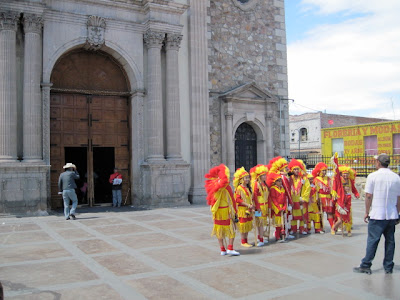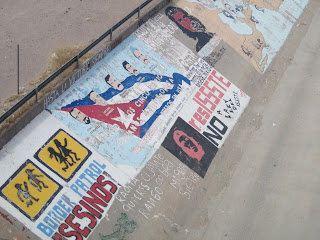 |
| View Of Juárez from El Paso, Texas |
 |
| Betty and Pedro, who I've known since 1992. They'll take good care of your car during your visit to Mexico. |
Ciudad Juárez; I first laid eyes on it in 1976 hitchiking through El Paso, Texas. From the U.S. side it stands out like some mysterious world---a world I waited another 16 years to explore.
 |
| Memorial for The Disappeared Women of Juárez |
My friend and co-worker Félix was my guide--he had all the connections: a part-time actor who moved freely through Juárez's vibrant day and night life: theater, peñas, protests, and other cultural events. The best thing about living eight years in El Paso--the time I spent in Juárez.
Now Juárez is passing through it's most difficult period since the Mexican Revolution--a "calvario," bearing a cross towards the edge of a cliff; a battlefield of the disastrous war on drugs. Many who have the means have fled the city. But most remain, waiting, praying, and hoping that this nightmare will end.
 |
Art and Protest Messages On The Mexican Side Beside The Seasonally Dry Rio Grande
I had grown cautious, not visiting Juárez in several years. But I couldn't forget an analogy an aquaintance in El Paso told me, long before this wave of violence, that compared border residents in the U.S. who were afraid to go to Mexico to the dog that urinates to mark its territory, but suddenly only marks a half circle, cutting out half its territory. I only ventured a few blocks into Juárez last June-- the difference was striking. The tourist strip had no tourists. |
At a store in Arizona I mentioned to the cashier that I was heading to Juárez and he questioned my wisdom. I quoted Félix from my last visit that "life goes on," to which he responded, "for some." While Juárez is a special case due to the level of violence, most of Mexico is safe for tourists, but the perception is that it isn't. Even in Juárez tourists are not the targets of the violence. But the bad news keeps folks away as media ratings rise when murders are the top stories. Fear is soundly beating reality.
After crossing the border I bought a newspaper with a front page headline about the previous day's carnage, "Sabado Negro: 13 Muertos, 8 en Multihomicidios." You had to go deep into the paper to find more positive stories, like a youth chess tournament.
This visit I planned to reclaim more of my old circle, venturing deeper into Júarez. It was a beautiful cool Sunday morning in April. My timing couldn't have been better--a mass of humanity was in the streets and plaza. Felix, who is working on a doctorate, once wrote a report after observing people in the plaza. He saw it as a form of resistance--refusing to surrender to fear and getting out of the house into the sunlight, enjoying companionship, feeding the pigeons, visiting the market--celebrating being alive.
 Another article in the paper proved Felix's thesis--a murder on a soccer field in a Juárez neighborhood had kept folks away. Now they were back playing soccer.
Another article in the paper proved Felix's thesis--a murder on a soccer field in a Juárez neighborhood had kept folks away. Now they were back playing soccer.
 |
| Images of Revolutionaries: Che Guevara, Sandino, Jose Martí, Fidel Castro, Pancho Villa, Camilo Cienfuegos, Emiliano Zapata |
 |
| Juárez's main plaza, La Plaza de Armas |
 |
| A Clown Entertaining Kids For Tips From Their Parents |
 |
| Matachines dance group posing in front of the main cathedral |
 |
| The Old Mission Church beside the Newer Cathedral |
 |
| Mass In the Cathedral |
 |
| One of Juárez's Oldest Restaurants: La Nueva Central Coffee Shop; A Favorite Stop of Mine |
 |
| Street Vendors |
 |
| My friend Felix giving me a lift |
 |
| The Old Mercado Cuauhtemoc near the cathedral; A great place to shop and eat |
 |
| A Vendor with religous statues, including "Santa Muerte" which has become popular with some due to the violence |
 |
| Announcing That The Circus Is In Town |
After spending a few hours in Juárez I crossed the bridge and got in line to clear customs. I struck up a conversation with the man in front of me. He had grown up in Juárez and moved to El Paso after high school. He owned some rental properties in Juárez but due to the crisis they were mostly unoccupied and the few tenants rarely paid any rent. "Losing your money is good in a way," he said almost cracking a smile, "you're not likely to be kidnapped for ransom." Then he added before departing, "Maybe one day they'll legalize drugs, and things will turn around for the better."
 |
| Crossing The Bridge Back to El Paso |
COMING UP: A Look Back At How The Residents Of Juárez Helped Stop Governor George W. Bush and the State of Texas From Placing a Nuclear Waste Dump On the Rio Grande



 Another article in the paper proved Felix's thesis--a murder on a soccer field in a Juárez neighborhood had kept folks away. Now they were back playing soccer.
Another article in the paper proved Felix's thesis--a murder on a soccer field in a Juárez neighborhood had kept folks away. Now they were back playing soccer. 




















No comments:
Post a Comment